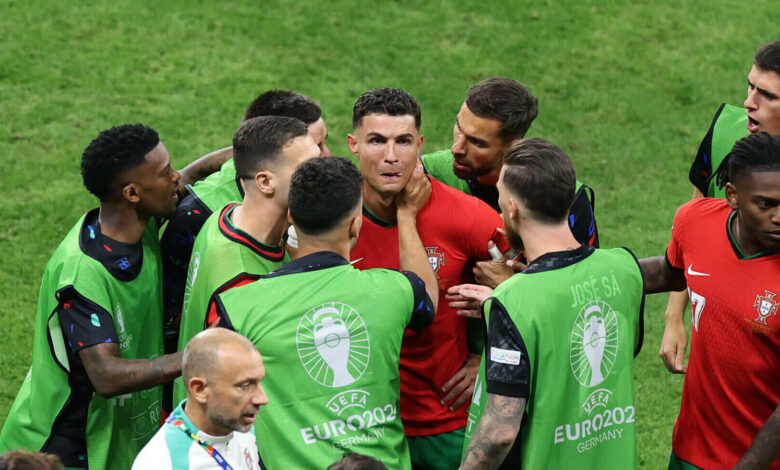Cristiano Ronaldo can’t be angry about the lights going out forever

For a second, it looked like Cristiano Ronaldo was on the verge of tears. Then suddenly, no, he was over the edge. The floodgates had opened and he was crying. In front of a packed house in Frankfurt and a huge global television audience, the world’s most famous athlete was in tears.
And there was still one match to be won, a place in the quarter-finals of the 2024 European Championship to be secured.
It was astonishing to watch. The Portuguese captain had endured another frustrating evening, still chasing his first goal of the tournament, and now, after having been given the chance to break Slovenia’s resistance, he had seen a penalty superbly saved by goalkeeper Jan Oblak. The tension and anxiety that had been building inside him suddenly boiled over.
Ronaldo had missed penalties before, sometimes in very stressful circumstances. He had cried on the pitch before: tears of sadness, tears of joy. But this was different because the match was not over. At 39, playing in what he admits is his last European Championship, he was crying not for a lost match but, it seemed, for the waning of his strength. They were like the tears of a matinee idol who realises he is facing his final curtain.
For once, he looked so vulnerable, so fallible, so… human. As the Portuguese players gathered at half-time of extra time, they looked up to see what looked like a broken man. One by one, they tried to lift him up. His former Manchester United team-mates Bruno Fernandes and Diogo Dalot grabbed him, as if to remind him who he was—who he still is. Fulham midfielder Joao Palhinha and Manchester City defender Ruben Dias did the same.

A crying Ronaldo is comforted by Dalot during the half-time break of extra time (Justin Setterfield/Getty Images)
It was remarkable that Portuguese coach Roberto Martinez kept him out in these conditions. Ronaldo looked finished. He barely touched the ball in the remaining extra time as Slovenia, for the first time that night, looked increasingly likely to snatch victory.
It went to a penalty shootout. What if Ronaldo missed again?
He didn’t. This time he hit his shot to the other side, Oblak’s right, and looked immensely relieved when the net bulged. It took courage, but there was no bravado in his reaction. It wasn’t the moment for his trademark celebration. Instead, he threw his hands together to the Portuguese supporters in apology.
Within three minutes, the Portuguese players and supporters were celebrating victory. Their goalkeeper Diogo Costa was the hero, saving all three of Slovenia’s kicks, while Ronaldo, Bruno Fernandes and Bernardo Silva converted theirs. It was an extraordinary performance from Costa, who had also made a crucial save to deny Slovenian striker Benjamin Sesko in extra time. Ronaldo, overcome with relief, hugged him and thanked him.
“There was sadness at the beginning — and joy at the end,” the five-time Ballon d’Or winner told Portuguese TV channel RTP afterwards. “That’s what football brings: inexplicable moments from the eighth (minute) to the 80th. That’s what happened today. Did I have the chance to put the team in charge? I couldn’t.”

Ronaldo apologetically celebrates his goal in the shootout (Justin Setterfield/Getty Images)
He referred to his penalty record throughout the season — “I haven’t failed once” — but he must know deep down that there’s more to it than just his spot-kick taking that’s under scrutiny at Euro 2024. Excluding the penalty shootout (as the record books always do), he has yet to score in his four appearances at the tournament. Barring a penalty against Ghana in Portugal’s opening match at the 2022 World Cup, he has now gone eight appearances without scoring in a major tournament.
Ronaldo scored 50 goals in 51 games in all competitions for Al Nassr last season. He also scored 10 goals in nine games in the Euro 2024 qualifying campaign, but half of those came against Luxembourg and Liechtenstein. He is the record international goalscorer in men’s football, with a somewhat ridiculous record of 130 goals in 211 games – but the highest-ranked teams he has scored against in the last three years are Switzerland (19th), Qatar (35th), Slovakia (45th) and the Republic of Ireland (60th).
And yet he takes so many shots. So many shots — 20 in total so far this tournament, at least seven more than any other player. So many promising strikes and dangerous free-kicks are sacrificed on the altar of complacency. There was one free-kick against Slovenia where, even in a stadium full of die-hard Ronaldo fans, he must have been the only one who thought he was going to score. Sure enough, his shot sailed well over the far post.

Then there are the shots he can’t get off because, formidable as his physique may look, his acceleration, speed and power aren’t what they used to be. There was a point in the first half when Bernardo Silva drifted in from the right wing and produced a cross that looked delicious at first glance. Ronaldo leapt but couldn’t reach it and, not for the first time at this tournament, you thought he might have wasted such a chance in his prime.
But his best days are long gone now. Longer gone than he can possibly imagine. He won the last of his Ballons d’Or in 2017 and even then, at 32, he had become a far more economical player than the unstoppable, irresistible force of his mid-to-late 20s.

Ronaldo beats Jan Oblak from the penalty mark in the shoot-out (Harriet Lander – UEFA/UEFA via Getty Images)
Some will argue that this is a tournament too far away for him, but the same was said of the World Cup in Qatar 18 months ago, where he made little impact and ultimately lost his place to Goncalo Ramos. It now feels like two tournaments too far away – or two tournaments in which Ronaldo would be better used as an option, perhaps occasionally as a substitute, swapping places with Ramos or Diogo Jota, rather than as the focal point around which everything else has to revolve.
It was almost surprising to hear Ronaldo describe this, in the post-match mixed zone, as his last European Championship. “But I’m not emotional about it,” he said. “I’m moved by everything that football means – by the enthusiasm I have for the game, the enthusiasm for my supporters, my family, the affection people have for me.
“It’s not about leaving the football world. What else can I do or win? It’s not about one point more or one point less. Making people happy is what motivates me the most.”

What more can he do or gain? That didn’t sound like Ronaldo, especially considering the scenes we’d witnessed earlier in the evening. He’s right, of course — his legacy and place among the game’s immortals were secured long ago — but his reaction to that missed penalty was not one of someone immune to the pressure to prove himself time and time again.
“He is an example for us,” Martinez said afterwards. “Those emotions (after missing the penalty) were incredible. He doesn’t have to worry about that much after the career he’s had and everything he’s achieved. After missing the penalty, he was the first to take the penalty (in the shootout). I was sure he had to be the first and show us the way to victory. The way he reacted is an example and we are very proud.”
Nice words, but Martinez has an important decision to make before Portugal plays France in the quarter-finals in Hamburg on Friday.
Ronaldo has often been the player to pull a team back from the brink over the years, but on Monday night he appeared defeated not only by Oblak’s penalty save, but also by the one adversary that ultimately catches up with every athlete: time.

GO DEEPER
The cult of Cristiano Ronaldo
(Top photo: Alex Grimm/Getty Images)




